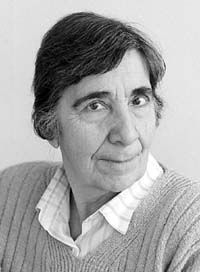The week before last American historian James Mace celebrated his fiftieth jubilee in Kyiv. Last week The Day wrote about this extraordinary man, a citizen of a wealthy country for whom Ukraine has become a second homeland. It all started in Oklahoma when he took up modern Ukrainian history; this country was then — and in many respects has remained — terra incognita for most Americans (Prof. Mace told me, smiling, “Don’t be surprised at Americans not knowing where Ukraine is located; they aren’t quite sure about Europe, either”). It was largely thanks to his research efforts and active public stand (articles carried by media across the world, contacts with the Ukrainian diaspora, work on a special Congress committee) that the world learned the truth about the Great Manmade Famine of 1932-33. And so did Soviet Ukraine. The wall of silence was first breached under Shcherbytsky, yet a lot of water would run under the bridge before all the horrible truth was exposed (we were so thoroughly brainwashed by the Soviets that sometimes even people whose parents or grandparents had died of hunger sincerely believed that the famine was horror fiction or at best considered it a local or chance occurrence).
James Mace busied himself with modern Ukrainian history when the Soviet Union was still strong, when no one could have fathomed its “unexpected demise.” The result of his studies was a 4-volume monograph, including a volume of documentary research relying on open Soviet sources (needless to say, there was no access whatsoever to the archives in the USSR) and three volumes of eyewitness accounts, stories by people who had survived the Holodomor and watched their relatives and neighbors die of starvation. One such witness (his parents, brothers, and sisters had starved to death) spoke at Prof. Mace’s jubilee held at the Teacher’s House. He told about his “happy” Soviet youth and about the American James Mace weeping at a meeting in Uman, listening to witnesses’ stories, and this considering that the US researcher had heard countless such stories previously.
When called Ukrainian, Mr. Mace says, “I’m a US citizen and always will be.” Yet one must be critical of one’s own country no matter what, even of America after the September 11 terrorist attack. There are numerous speculations about the notion of terrorism in the United States, just as there are in Russia with regard to the Chechnya War. The fact remains that there is no universally accepted formula, and it is true that definitions have always ranked among the lasting unsolved problems of the human race. There are numerous relative factors involved with terrorism; a country attempting to define it cannot but serve its own interests and impose its concept on others.
As for today’s Ukraine, we all must remember that this country remains a creation of the Soviet Union, a product resulting from a system whose requirements could not be met without breaching that system’s rules. This regularity is still at play; everybody is accused of wrongdoing, everybody is guilty, and there is no law as a rule of the game that everybody must observe. In fact, this plays into the hands of the government machine; the easier one is proved on the wrong side of the law, the easier to keep that one under control and use where and whenever necessary.
People speaking at the jubilee noted Prof. Mace’s singular trait. Having lived in Ukraine for so many years, he remains unadapted to breaches of democracy, human rights, and acts infringing on human dignity — unlike some of his Ukrainian colleagues. Probably because he has a totally different mentality.
Everyone attracts others like him or herself. There were not many in attendance to greet the celebrity, but they were people seldom if at all seen on television screens, at high ranking receptions, and other top level functions with the attendant pomp (it is as though they were underground; sometimes it is hard to believe that they ever existed); among them were scholars investigating crimes of the past regime, human rights champions, former prisoners of conscience, and poets, particularly Valentyna Honchar, widow of the patriarch of Ukrainian literature. Some were at the Teacher’s House just because they had happened to hear about James Mace, his studies, and attempts to help us, and decided to join the celebration to thank him. And of course, the celebrity’s Ukrainian in-laws, relatives of his wife, Natalia Dziubenko, poetess and novelist.
Being in that friendly crowd, rubbing elbows with well-wishing intellectuals, hearing sincere words, sensing an atmosphere of genuine mutual respect was like a gulp of crisp mountain air. Especially after all that oppressive aura of hatred and venality often and distinctly characteristic of not only politics, but also, regrettably, people of the Christian Church.
In conclusion, I would like to quote from Yevhen Sverstiuk, a noted human rights champion, former prisoner of conscience, man of letters, and public figure: “It is not necessary to be Ukrainian to serve Ukraine’s good. It is enough to be human. James Mace has raised the level of our spiritual culture and enriches our life.”







